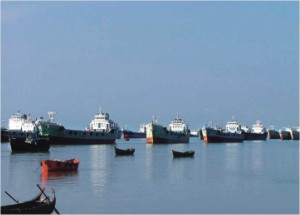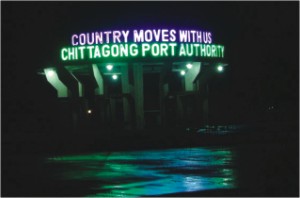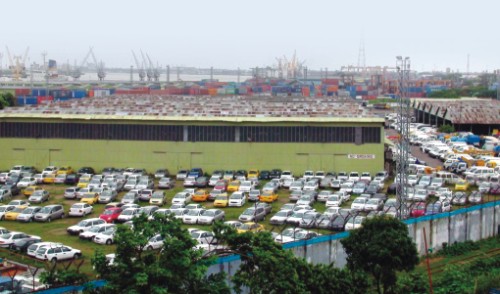
Inside
|
Chittagong and other ports: An ordinary citizen's view Former shipping ministry secretary, Ghulam Rahman, brings his expert opinion to bear on the issue of the nation's beleaguered ports Nobel laureate Professor Muhammad Yunus, addressing a reception accorded to him in his hometown Chittagong recently, stressed the need for setting up of a mega -seaport there.
My first introduction to Chittagong port was in 2000. I was then commerce secretary. My batch-mates Suhel Ahmed Choudhury was secretary, Ministry of Shipping, and Zakir Ahmed Khan was chairman, National Board of Revenue (NBR). The business community was very unhappy with the performance of the port. Suhel proposed that the three of us should visit Chittagong and take some on-the-spot decisions to improve the port's efficiency. I reluctantly agreed, as I had a kind of apathy for quick and instant decision-making. There was a big meeting in the "Bandar Bhaban," attended by government officials and private sector representatives. Suhel presided and did much of the talking. Zakir joined him occasionally. I was basically a listener. That evening, while traveling to the port area to open a "Green Channel" for speedy clearance of RMG raw materials, I told them: "I am now convinced, you two are responsible for all my problems." My real encounter with the port was in November 2001 when I became secretary, Ministry of Shipping. The port was then tagged with labels like "most expensive port in the region," "its inefficient operation costs the economy $1 billion a year," " it is the second most pirate infested port in the world," etc. Since then the situation has not changed much, except that then it used to handle about 500,000 TEUs while now it is over 800,000 TEUs a year. In my cool, air-conditioned secretariat office, I spent days trying to comprehend the underlying causes of the enormous problems that the port was beset with, and to find ways to get out of the mess. It appeared that at the root of all the problems lay greed, corruption and parochial interests. The vested interest groups are composed of not only government and port officials and labor unions, but also corrupt politicians and private sector enterprises providing services to maritime transportation. It's a huge and complex Gordian knot with many layers. The only solution I could conceive of was cutting the knot with ICT. All of efficiently run ports all over the world have computer systems, with interconnectivity with the custom's systems, for speedy storage, clearance and delivery of goods. I asked the Port Authority to invite tenders for installation of systems already tested and in use in some other ports, with customization on turnkey basis, and to finance the program from its revenue budget as processing of a project under the Annual Development Plan would be time consuming. Apparently they complied, but had a different agenda. When the tender process was completed I came to know that the tender was to study and computerize the existing operational system of Chittagong port, a far cry from what I had in mind. I discussed the matter with port officials, and directed them to invite a fresh tender to install a tested system in use elsewhere. Then, a former US ambassador representing a US consulting company and its local representative, a nephew of former prime minister Khaleda Zia, called on the then shipping minister late Lt. Col. (Rtd.) Akbar Hossain. The minister sent them to me. I explained to them the kind of system we would like to have at the port and told them that the port authority would soon invite a fresh tender, and that if they competed and got the job I would be delighted. The port authorities, for reasons best known to them, were delaying invitation of the revised tender and, when I went on leave preparatory to retirement, sent the American company's proposal for approval of the government. However, the Purchase Committee of the cabinet did not approve the awarding of the contract, as the American company had no prior experience of port computerization. In the meantime, Asian Development Bank (ADB) stepped in with funds to improve port efficiency. A new computerization project was conceived and studies undertaken, but precious little was done. I believe that installation of a computerized system, tested and in use in some other ports, should be the first priority for improving the performance of Chittagong port. The system should be a comprehensive one, linking ports, custom authorities, importers and exporters, shipping lines, shipping agents, clearing agents, freight forwarders, banks, insurance companies and all other stakeholders in the maritime transportation of goods, and all transactions and inquiries should be settled on-line. It should not cost more than Tk 10-15 crore and take 8-12 months to install. The port should establish sister-port relationships with one or two modern ports, with agreement for exchange and training of port and custom officials, to infuse new ideas and dynamism in its operation. The issues relating to storing and reshuffling of goods for custom's checking at port yards, parking and traffic flow management of trucks and other vehicles within the port area, labour unions including those related to "dock workers management board," and security concerns, should be addressed and resolved in the light of the experience of other regional ports. The Bangladesh economy is rapidly getting integrated with the rest of the worlds. The country's export-import trade has been increasing by 20-25 percent in recent years. With acceleration in the economic development its foreign trade is bound to grow at an even faster rate. If the expansion of the port facilities does not keep pace with the need of the growing economy its growth potential would suffer. During Sheikh Hasina's premiership, a number of large infrastructural development projects of the port, including installation of modern equipments and construction of New Mooring Terminal, were approved. These were the port's self financed projects. However, large equipment purchase tendering was marred by inefficient handling of the tender processing and, save the appointment of a French consultant, little progress was made in constructing the New Mooring Terminal (NMT).
I told him that if the consultant's contract was cancelled project implementation would be delayed by several years, and economic development would be strangulated. I made it clear to the port authority that the government would not agree to cancellation of the consultant's contract, and that they should resolve all unresolved issues immediately with the consultant in one long session of several days, if required. The move worked. The consultant's contract as well as New Mooring Terminal were saved. The then PM Begum Zia laid the foundation of NMT in October 2002. At the suggestion of the shipping ministry she stressed that the Chittagong port would be developed to cater to the maritime transportation needs of all the countries south of the Himalayas. Later, a committee comprising of the secretaries of the ministries of Shipping, Commerce and Foreign Affairs, with shipping secretary as convener, recommended allowing the seven eastern states of India to use Chittagong port for their trade, initially for exports only. The construction of NMT is now nearing completion. However, a controversy has arisen; who will operate it? In the original NMT project paper it was stipulated that the port authority would purchase the equipment and operate the terminal. As it appeared that the development of the port on a "land-lord" model would be more appropriate, it was decided that management of NMT should be awarded to a private sector operator who would also bring in the necessary equipment. A memorandum of understanding was signed with IIFC for facilitating selection of the port operator in a transparent and competitive manner. However, it seems that the scheme has lost its way somehow in the meantime. The NMT alone will not be able to meet the port service requirements for the growing Bangladesh economy and of the region. A few more terminals should be added very soon. New naval establishments should be developed in Maishkhali Channel, or in some other suitable location, to make space available for development of additional terminals on the banks of the Karnaphuli River. The development of a deep-sea port at Chittagong would be premature. Its feasibility in the near future, as Chittagong is far away from the main shipping lanes of the world, is doubtful. However, the Ministry of Shipping, at the behest of the then prime minister Khaleda Zia, appointed a foreign consultant to assess its viability. It could be viable only when per-capita income of the countries in the region reaches over $3,000 and if Bangladesh, India, Bhutan, Nepal, Myanmar, and China come to an agreement that they would collectively build and use this new port. For a nation of 140 million people the emphasis should not be on the development of a single port. It would be prudent to develop a port system comprising several ports -- at least one at the estuary of the Naf, then Chittagong and Mongla.
A small port at Teknaf, for coastal trade with neighboring Myanmar and Thailand, became operational in 2002. Another port could be developed at Moheshkhali, and yet another at Sibsa near Mongla. With the construction of the Padma Bridge more goods will be transported to Dhaka and the northern districts through the Mongla port. Further, if container terminals could be developed in and around Dhaka, on the banks of the Buriganga, the Meghna, and the Sitalakha, transportation of goods directly from Singapore and Colombo in small, flatbed container ships carrying 300-400 TEUs would become a reality, and would be more cost effective. However, development of other ports is least likely to diminish the importance of Chittagong. As the economies of the South and South-East Asian countries gradually get integrated the Chittagong port could emerge as a natural regional shipping hub. It is said that a port can change the fate of a nation. Chittagong, I believe, could be such a port for Bangladesh. Photos: Zobaer Hossain Sikder Ghulam Rahman is a former Secretary. |
 Earlier, in New Delhi on January 29, in his keynote speech at the international conference to commemorate the centenary of Mahatma Gandhi's "Satyagraha" form of political movement, he pleaded for development of Chittagong port as a regional hub.
Earlier, in New Delhi on January 29, in his keynote speech at the international conference to commemorate the centenary of Mahatma Gandhi's "Satyagraha" form of political movement, he pleaded for development of Chittagong port as a regional hub.  With the change of government in 2001, the port authority came up with all kinds of complaints against the French consultant and suggested that their contract should be scrapped. The then shipping minister, late Col. Akbar, was in a fix.
With the change of government in 2001, the port authority came up with all kinds of complaints against the French consultant and suggested that their contract should be scrapped. The then shipping minister, late Col. Akbar, was in a fix. 